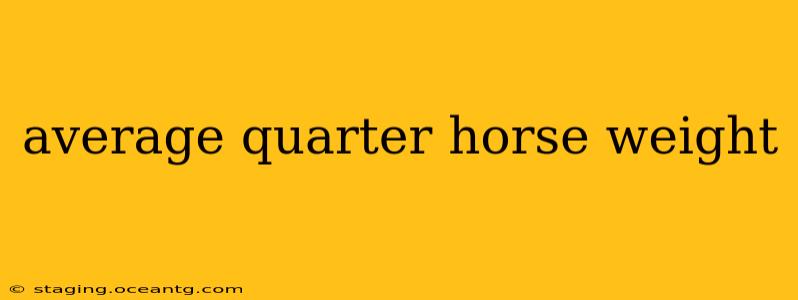The American Quarter Horse, a breed renowned for its versatility and athleticism, exhibits a considerable range in weight depending on several factors. Understanding the average weight, and the factors influencing it, is crucial for owners, breeders, and anyone interested in this iconic breed. This guide will delve into the average weight, explore contributing factors, and answer frequently asked questions.
What is the Average Weight of a Quarter Horse?
The average weight of an adult Quarter Horse falls between 900 and 1,200 pounds. However, it's crucial to understand that this is a broad range. Many factors influence an individual horse's weight, and falling outside this range doesn't necessarily indicate a health problem.
Factors Affecting Quarter Horse Weight
Several factors contribute to the variation in Quarter Horse weight:
-
Gender: Generally, mares (female horses) tend to be slightly smaller and lighter than stallions (male horses). Gelding (castrated male horses) typically fall somewhere in between.
-
Age: Weight fluctuates throughout a horse's life. Young horses are naturally lighter, gradually increasing in weight until they reach maturity at around 4-5 years old. Weight may slightly decrease in older horses.
-
Height: Taller Quarter Horses tend to weigh more than shorter ones. This is a straightforward correlation: greater height generally means greater bone mass and muscle development.
-
Build: The horse's body type plays a significant role. Stockier, more muscular Quarter Horses will naturally weigh more than those with a finer build.
-
Nutrition and Exercise: A horse's diet directly impacts its weight. A balanced diet, appropriate for the horse's age, activity level, and body condition, is essential for maintaining a healthy weight. Consistent exercise contributes to muscle development and overall fitness, indirectly influencing weight.
-
Genetics: Like any breed, Quarter Horses exhibit genetic variations. Some bloodlines might predispose individuals to being naturally larger or smaller than the average.
-
Health: Underlying health conditions can significantly influence a Quarter Horse's weight. Weight loss or gain might be a symptom of an illness, necessitating veterinary attention.
What is Considered Overweight or Underweight in a Quarter Horse?
Determining if a Quarter Horse is overweight or underweight requires a holistic assessment, not solely relying on weight. A veterinarian will use a body condition score (BCS) system – a numerical scale that assesses fat reserves in different areas of the horse’s body – to determine the horse's ideal weight range. This system is far more accurate than just looking at the weight alone.
How Can I Determine My Quarter Horse's Ideal Weight?
The best way to determine your Quarter Horse's ideal weight is to consult with your veterinarian. They can assess your horse's body condition, age, and overall health to provide personalized guidance. They can also help identify any potential underlying health issues contributing to weight fluctuations.
What Should I Do if My Quarter Horse is Overweight or Underweight?
Significant deviations from the ideal weight range warrant veterinary attention. Your veterinarian will help you create a plan to address the underlying cause, whether it's dietary adjustments, increased or decreased exercise, or treatment for an underlying medical condition. Never attempt to drastically alter a horse's weight without professional guidance.
Are there different weight ranges for Quarter Horses used for different disciplines?
While the average weight range remains relatively consistent, subtle differences might exist depending on the discipline. For example, racing Quarter Horses might be slightly leaner to enhance speed and agility, while those used for ranch work might be more muscular and slightly heavier to handle strenuous tasks. However, these differences are usually minor and fall well within the overall average weight range.
This guide provides a comprehensive overview of the average Quarter Horse weight and the contributing factors. Remember, consulting with your veterinarian is crucial for ensuring your Quarter Horse's health and well-being. They can provide personalized advice based on your horse's individual needs.
